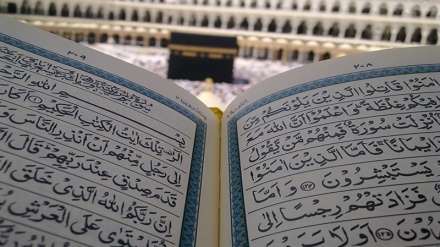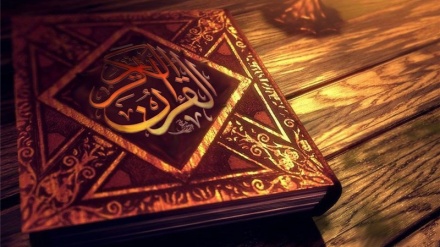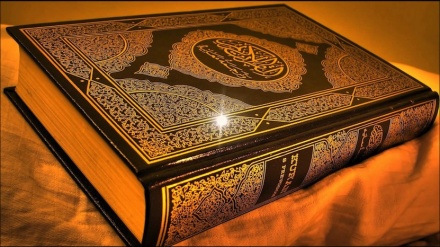Path towards Enlightenment (1051)
Welcome to our latest episode of “Path towards Enlightenment”, which is an endeavour to make you and us familiar with an easy and fluent explanation of God’s Final Scripture to all mankind, the holy Qur’an that was revealed to the Last and Greatest of all Messengers, Prophet Mohammad (Blessings of God upon him and his progeny).
Today we start explanation of “Surah al-Qiyamah”, the 75th in order of compilation of the holy Qur’an. It has 40 Ayahs and was revealed in Mecca. The title means “The Day of Resurrection” or “The Rising”. It opens with the Almighty Creator’s emphatic oath “By the Day of Resurrection”. It disproves the denial of the Day of Resurrection by unbelievers through a convincing description of God’s Infinite Power of creation of everything in an exquisite manner from nothing, which is ample proof of restoration of the same thing or person in its original form long after destruction, death, decay and disintegration of bones into dust. In other words, the creation of mankind from a drop of semen as a token of Divine Omnipotence in recreating human beings after death is logical and beyond an iota of doubt. In short, the Surah makes mention of the happy and sorrowful fate of the good and evil doers.
According to a hadith, regular recitation of Surah al-Qiyamah and observing its inunctions shall enable the reciter to safely cross the Siraat or the Bridge to Paradise on the rim of Hellfire on the Day of Resurrection.
Here we present you the first Six Ayahs of this Surah:
“In the Name of Allah, the All-Compassionate the All-Merciful – I swear by the Day of Resurrection!
“And I swear by the self-blaming soul!
“Does man suppose that We shall not put together his bones?
“Yes, indeed, We are able to proportion his fingertips!
“Rather man desires to go on living viciously.
“He asks, 'When is this Day of Resurrection?'"
This Surah starts with two oaths. First, Allah swears by the Day of Resurrection, since it is the undeniable reality that will definitely occur on the basis of Divine Justice for the final judgement to reward the true believers who were virtuous as well as those who had repented before death of their wrongdoings, with the bliss of the different strata of Paradise, and to punish the unbelievers, the unrepentant sinners, and the deniers of truth and resurrection. Then the Almighty Creator swears by the “Nafs al-Lawwamah” which means the self-blaming or self-reproaching soul. This is a reference to the conscience ingrained in all human beings, and which if kept awakened, brims with happiness upon doing good and righteous deeds, and feels guilty and chastises itself through seeking forgiveness from the All-Merciful Lord upon committing wrong deeds. In other words, conscience is so majestic that God Almighty swears by it since it leads a person towards repentance and salvation. Thus, woe to those who have killed their conscience or numbed it in pursuit of sins and wicked ways, thereby disobeying God and being thankless to His favours.
It will not be out of context to cite here a hadith from the Prophet of Islam, who says that on the Day of Resurrection, both the virtuous and vicious will express regret – the virtuous for not having done more good deeds, and the vicious for wasting their life in pursuit of evil deeds.
Ayah 3 questions the ignorance and stupidity of those who think how can God gather bones scattered or reduced to dust and restore long dead persons to life in their original shape and form? The next Ayah is the Divine reply that the Almighty Creator has the Power to completely resurrect every person, right up to the fingertips, as perfect as they were when first alive. It should be noted that the fingertips of every person is exclusively his or her own, and differs from others, which means there are no two persons with the same fingertips, as has been proven by modern science.
Ayahs 5 and 6 refer to the root cause of denial of Resurrection, and mean to say that those immersed in sins and wishing to live a freewheeling life without any accountability, deny the Day of Resurrection and the Final Judgement. Thus, they derisively ask the believers: When is this day of Resurrection that you speak about, if you are right? Since only God knows about its exact occurrence the unbelievers mock the Prophets and the believers by saying: there is no resurrection.
From these Ayahs we learn that:
- Conscience is one of the great bounties granted to mankind by God to distinguish virtue from vice, and judge one’s own deeds as a prelude to repentance.
- The Almighty Creator has the power to restore in the original form after death of every creature with the minutest details, including fingertips.
- It is firm belief in the Day of Resurrection that prevents people from committing sins.
- Deniers of the Day of Resurrection have no proof or logic to support their claim, which is based on living a freewheeling life without accountability.
Now let us listen to Ayahs 7, 8, 9, 10, 11, and 12 of the same Surah:
"But when the eyes are dazzled,
“And the moon is eclipsed,
“And the sun and the moon are brought together,
“That day man will say, 'Where is the escape?'
“No indeed! There is no refuge!
“That day the abode will be toward your Lord.
These Ayahs point to the horrendous events towards the end of the transient world and before occurrence of the Day of Resurrection, when the mankind, especially the disbelievers and deniers will be struck with horror and search for refuge but will not find any safe place or escape. The sun and the moon brought together is a reference to the darkening of the bright sun as a result of which the moon whose role is mere reflection, loses its borrowed light, as the order of the universe is totally disturbed, since every person is set on the path of return towards the Almighty Creator for the final judgement in the Divine Court.
From these Ayahs we learn that:
- The existing world system of the universe will collapse before occurrence of the Day of Resurrection.
- There is no escape for the disbelievers and deniers of truth from the horrendous events towards the end of the transient world.
- God created us and towards Him is our eventual return.
In conclusion of this week’s episode of Path toward Enlightenment here are Ayahs 13, 14, and 15:
“That day man will be informed about what he has sent ahead and left behind.
“Rather man is a witness to himself,
“Though he would offer his excuses;"
These Ayahs refer to the proceedings of the Divine Court, where every person will be informed of his/her deeds and the consequences of those deeds. No one will be wronged by the All-Merciful Lord Who will make every person witness the deeds they had done, for which there is neither denial nor excuse. Of course, the believers who had erred and sought forgiveness will be pardoned.
These Ayahs teach us the following points:
- The sinners will be witness to the deeds they had done and will find no excuse for denial of truth.
- No one will be wronged in the Divine Court and the forgiveness of the All-Merciful Lord will prevail for the deserving on the Day of Resurrection.
RM/AS/ME


